 |
| There is a life beyond kids' books. Apparently. |
Once in a
while, I venture out of the kids’ section of the bookshop or library and find
myself in the grown-up aisles. Usually this happens when I’m on the look-out
for the latest title from Haruki Murakami, Jonathan Coe, David Mitchell or ArtoPaasilina, but occasionally I end up with books that I haven’t looked for at
all and didn’t even know existed. Such was the case with Jo Baker’s Longbourn, a hand-me-down from a friend
who has recently been converted to the joys of tidying and did a clearout of
her shelves.
I am a
long-time fan of Jane Austen’s, whose books I have read and re-read a
respectable number of times (which is quite a rare occurrence for me). Why, I
even wrote a thesis on Presentation and
Representation of the Body in Pride and Prejudice, Persuasion and Sanditon! A clear favourite, as for
a lot of people, is P&P which I have read enough times to feel like I could
quote the dialogues verbatim (but I can’t really), which I’ve seen adapted
numerous times on TV and on stage, and of which I have read a handful of spin-offs.
Among the latter, I would heartily recommend Natasha Farrant’s Lydia, the Wild Girl of Pride and Prejudice:
a brilliant, brilliant take on the original that gives Wickham a break and
Lydia a chance, and is a great teen novel in its own right.
But back to
Longbourn. Longbourn is the Upstairs Downstairs version of P&P, with a
main focus on Downstairs, as we follow Sarah the maid in her interactions with
her peers, her immediate superiors (Mrs Hill) and her ‘betters’. With Sarah we
scrub, we brush, we polish. We scatter tea leaves to help sweep up the dust, we
trim bonnets and wash Mrs Gardiner’s kids’ stinky nappies. We trek through the
muddy lanes of Meryton, avoiding dodgy militiamen and trundling carriages. Young
Polly’s less-than-thorough approach to most jobs quickly irritates a reader who
is wholly on conscientious (but not all-accepting) Sarah’s side; or at least
until we find out Polly is only twelve and way too young by modern standards to
be doing most of the work that is her lot.
Baker has
done her research very well and wears it very lightly and yet it’s in plain
sight. The craftsmanship of Sarah and her colleagues as they go through their
unforgiving chores is fascinating and, perversely, a joy to behold. The
dirtier, the better. Suddenly, the likes of Elizabeth and Jane appear much more
alive and human now that we know how their soiled linen is washed and boiled be
it as part of the dreaded weekly washday or following their ‘monthlies’.
And yet, at
the same time, they remain figures at the periphery of Sarah’s life and story. The
Bennets are, ironically, enormously absent, even though their requests and
needs dictate what goes on downstairs. Shadows and shadow-puppet masters at the
same time, the family cannot claim Longbourn
as their own and the novel is not Pride and Prejudice. Cleverly, the original gives Baker’s book its
tempo and an initial framework, but not its plot. All the events that readers
of Austen know are only relayed in so far as they impact on the maids and cook
and footman, all the social engagements becoming another chore on an infinite
to-do list, the balls equating to somebody waiting half the night in the cold
by the carriage… Darcy’s declaration is a non-event, it only features in as
much as Sarah opens the Collins’ door to him on the fateful day where he makes
a complete idiot of himself. But she’s not in the room to see it and nothing
transpires below stairs.
| Who do you think curled that hair and laundered that frock? |
As Baker
puts it in her afterword, ‘where the two books overlap, the events of this
novel are mapped directly onto Jane Austen’s. When a meal is served in Pride and Prejudice, it has been prepared in Longbourn.’
 |
'When a meal is served in Pride and Prejudice, it has been prepared in Longbourn.’
|
Not all
Austen fans will be charmed by Baker’s take as it will be seen as ‘tinkering’
with beloved characters. She adds nothing that isn’t already there in so far as
the Upstairs are concerned, but she digs deeper behind the scenes and pushes
some traits, sometimes to the extreme. Lizzie isn’t all that nice and charming
when dealing with people are not on her social radar (‘Oh! Smith! You mean the footman!
(…) You called him Mr Smith, that’s
why I misunderstood you; I thought you meant someone of my acquaintance. I
thought you meant a gentleman.’) And as for Wickham, suffice it to say that he
definitely does not get a break here.
Baker’s
prose is masterful and so self-assured that it is hard to believe this is her
début. Just as she’s not afraid to unpick the fabric of P&P, she boldly
goes at the fabric of language, often playing with nominal sentences that,
despite their lack of verbs, are hugely dramatic and bombard the reader’s
senses. When Sarah and Darcy finally come face to face (not by the Pemberley pond, not in a bathroom, but in a perfectly respectable drawing-room scene), in the closing pages of
the novel, here is what we can read: ‘Sarah risked a look at his big handsome
face, the meat of him: the sheen of cheekbone and nose, the gloss of eyes, the
smooth rubbery flesh of his shaved lip. He was descended from a race of giants;
he must be.’
This is a rich, daring, vivid and, yes, meaty, reimagining that more than stands on its own two legs and has a lot to say about the horrors and joys of work, the place and consideration of women and girls, the passing of time, the madness of war, and the importance of making a place your own, be it Pemberley or indeed Longbourn.
Highly recommended!


No comments:
Post a Comment